Table of Contents
Life and Education Ideas of Aristotle:
Aristotle Brief Life Sketch:
Aristotle is one of the greatest philosophers and educationists of the world. According to Munroe, “Aristotle is one of those educational theorists that had the greatest influence upon subsequent times”. Aristotle was born in 384 B.C. in a colonial city of Greece named Stagira. Aristotle was not a citizen of Athens by birth. His father had served as a Doctor in the Court of the King of Macedonia and hence the early period (childhood) of Aristotle passed in wealth and prosperity. He received his primary education at home. At the age of 17 years, he was admitted to the famous school of Greece named ‘Academy’. Before this, Aristotle had to study at home and consequently from the very beginning he had developed an interest in scientific studies. Some scholars call him the father of scientific studies. The tendency of scientific studies was in the very blood of Aristotle. His father was a doctor. Because of the influence of his father, Aristotle was attracted to the study of biological science. Aristotle was considered the greatest scholar of his period. He was so much attracted towards studies that his learned teacher Plato called him the “Reader”. Aristotle had great respect for his teacher. Plato also had a great love for his disciple, who was a very talented student, although physically he was a very ugly person. Aristotle has written on the subjects of Theology, Metaphysics, Politics, Economics, Physics etc. He was not a pure idealist. While his teacher was an idealist in the field of politics, Aristotle was a great realistic, politician, who wanted to implement his ideals.
According to Professor Barker, the life of Aristotle can be divided into three periods. The first period was passed by him in Athens and lasted for 20 years (367 to 347 B.C.). The second is the period of travelling and lasted for 12 years. Some of his period was passed in North West of Asia Minor and the rest in Macedonia. Then comes the master period, which Aristotle passed in Athens. This period terminated in 320 B.C. when Aristotle died in Athens.
Although, Aristotle was born in the family of a Doctor, yet his education took place under the guidance and guardianship of a great idealist, scholar and politician, named Plato. He was admitted to the ‘Academy’ of Plato at the age of 17 years and he remained in Academy till the death of his teacher. That is to say, he continued his studies in the Academy for 20 years. This Academy made a great influence on the life of Aristotle. Aristotle had gone there to receive education from Plato, perhaps the greatest scholar and philosopher of that period and hence Plato had made a great influence upon the life of Aristotle.
After the death of Plato, Aristotle left Athens for a period of 13 years and travelled from one place to another. For three years, he remained the teacher of Alexander the Great. Thereafter, he returned to Athens and wrote all his books within a period of 12 years. He also opened a private school in Athens named ‘Lyceum’. During this period, he received help from Alexander the Great. He also married the daughter of one of his friends, who remained faithful to him till his death. He did not agree with his teacher’s view about women. He supported the institution of the family. He had a great experience of life and hence he was attracted towards the realism of life rather than towards the idealism towards which his teacher Plato was attracted. He has been rightly regarded as the greatest scholar of his time.
The death of Alexander made a great influence on Aristotle. For some time, he found himself in great difficulty. His enemies levelled different charges against him. He left Athens and went to Chalcis so that he might not have to meet the same fate, as Socrates had to face. He died in 322 B.C. at the age of 62 years. The life period of Aristotle was an age when the glory and grandeur of the city-states of Greece had vanished. The independence of the city-states had ended. But the influence of political anarchy and other contemporary events did not influence the life of Aristotle. He was a great theorist of his time. He did not lose patience after seeing the miserable condition of the city-states. In his book, “Master of Political Thought” Foster has written he is unaffected by the movements of his own time and detached from contemporary happenings. The spirit which he expresses (at least in his political works) is that all classical age of Greece, which passed before he was born”.
Aristotle and Plato:
Aristotle is regarded as the greatest scholar of his time. Plato was his teacher. He had great respect for his teacher, although he did not agree with all the ideas of Plato. He was so much devoted to studies that Plato called him “The Reader”. Aristotle was admitted to the Academy of Plato at the age of 17 years and remained there till the age of 37 years. Plato died in 347 B.C. After his death, Aristotle left Athens and set out to travel to foreign countries. For 12 years, he travelled in Asia Minor and Macedonia. During this period, he remained the teacher of Alexander the Great for three years. At this time, Alexander was only 12 years old. He had great respect for his teacher. In 335 B.C. Aristotle returned to Athens at the age of 49 years. There he had opened a school, where he imparted education till his death.
People noticed a great difference between the ideas of Plato and Aristotle, but the fact perhaps is not this. Of course, we may say that both followed different methods, but they reached the same conclusion. The difference is only in their ways and not in the element or ends. The idealism of Plato is not much away from the worldly experience. He never lost sight of reality and in fact, he arrives at his idealism beginning from the reality of life. While defining the ‘matter and form’, Aristotle also remained quite closer to idealism while moving towards spiritualism. The influence of Plato is clearly visible in the work of Aristotle. Both were of the view that a loose educational system was the cause of the decline of the citizen of Athens. Both of them wanted to keep education under the control of the State. Both emphasized equally the education of mind and body. Like Plato, Aristotle also was of the view that the education of a person should start from his early childhood. According to him, it is necessary that the education relating to habits should precede the education relating to intellect.
According to Aristotle, proper education to a person can be given on the basis of a natural tendency and healthy body. The educational ideas of Aristotle contain the essence of the educational principles of Plato. Politics was a subject of respect for Plato as well as for Aristotle and both were of the view that the welfare of the human race depends upon the organization of proper politics. Both believed in the education of able citizens. Both were of the view that in this respect the State should be given full rights. Plato wanted to include education in the whole life of man. He presents the programme from childhood to the old age of man. Aristotle also regards education as a part of whole life. Plato explains his educational scheme in a decent literary way. There is a lack of scientific basis in the principles and ideas of Plato. Aristotle could not explain his ideas in a decent literary way. The ideas of Aristotle are found in scattered speeches. He does not propound the scheme of adult education but what he tells or writes is full of scientific ideas. In many respects, his ideas resemble the ideas of the modern period. According to Plato “ideas” have their independent existence. But Aristotle does not agree with this view. According to him, they are the form of the matter. Without matter, he cannot dream of the form. Plato emphasized the awakening or consciousness of the individual. On the other hand, Aristotle emphasized the awakening or consciousness of the race. According to him, the chief aim of the life of the individual is to attain happiness and not the attainment of wisdom, as Plato said. He forgot the willpower of the individual. But the psychological analysis of Aristotle seems to be much more advanced. Aristotle saw virtue not in “knowledge” but in will-power. The form of willpower is not found in any constant or permanent condition. Its form can be seen in a continuous process. Thus, according to Aristotle, the highest aim of man is action and not the attainment of wisdom or knowledge as Plato said. Thus the ideas of Aristotle are full of realism.
Natural Characteristics of Child and Aim of Education:
According to Aristotle, the child has all the characteristics in him but in the beginning, he is the creature of desire and will. According to him, child like an uncivilized person has an utmost desire for happiness. They (children) do whatever comes to mind. Man is a creature of many desires and feelings. All those can be found in the nature of the child. All the actions of children are recognized by feelings, competition, shyness, fear, surprises and happiness. Aristotle was of the view that happiness could not be achieved in childhood. Modern scholars do not agree with this view of Aristotle. Aristotle was of the view that the education of man should be completed at the age of 21 years. From this point of view, he divides the education of a man into three periods. The first period lasts up to the age of 7 years. In this period attention should be diverted to the physical development of the child. For his moral and intellectual development, he should also be taught music. The second period begins after the completion of 7 years and continues till 14 years. Lastly, the third period starts from the age of 14 years and continue up to 21 years. According to Aristotle, less emphasis should be given to the physical development of the child in the second period and more attention should be diverted towards his moral and intellectual development. However, in the third period, the child should be made accustomed to doing as much physical work as possible. While criticizing the educational ideas of Aristotle, Dr Barker has remarked that Aristotle has given more emphasis to physical development than his teacher Plato. According to him, the educational scheme of Aristotle is not well-organized. He has given very little importance to the study of literature. He has laid great emphasis on the physical development of the child.
Aristotle has emphasized the development of habits. According to him, the development of habits has a special position in the field of education. The character of a man depends upon good habits. According to him, the character is the sum total of the habits and ideals of a man. Modern psychologists also agree with this definition of the character. However, they also add the power of determination to the character. They contend that the character of a person will depend upon the actions that he does. That is why Aristotle has said that the individual is himself responsible for his character. The character of an individual can be good only when he does good actions according to his own inspiration. If he is forced to do any work then it will adversely affect his character. These ideas of Aristotle clearly indicated that force or compulsion is harmful in the process of education. Such an atmosphere should be created so that the individual may be inspired to do things on his own. Nature only gives us certain tendencies. According to Aristotle, it is the task of education to convert these tendencies beautifully into character on the basis of habits and intellect.
Thus, Aristotle gives prominence to nature, habit and intellect in the field of education. At that time, it was difficult for all the teachers to develop the character of the child. This problem was resolved through the above-mentioned method. Aristotle had great sympathy with the slaves of Athens. He regarded industrial work, agriculture, commerce etc., as the works of slaves. He was of the view that because of performing these works and consequently of the lack of leisure, slaves could not develop their character. He wanted to give a liberal education to the citizens of Athens. He also wanted to give education, especially relating to daily needs to the slaves. He did not believe in imparting education that gives us only theoretical knowledge. According to him, knowledge should be helpful to make the citizen able and efficient.
Nature and Aim of Education:
According to Aristotle, attainment of happiness is the aim of education. Happiness can be attained only when there is harmony in the works of different powers of man. According to Aristotle, happiness can be attained by the development of good health, big and happy family, fame, respect, proper use of leisure, good moral character and the development of intellectual powers. The aim of education is, therefore, to develop all these qualities. Aristotle thoroughly considered the educational problems of his time. During his time, there was a controversy among the citizens of Athens as to whether education should be under the control of the State or should be free from it. It was also not definite as to the education of when subjects should be imparted. Different scholars were of different views in this connection. There was also no unanimity in regard to means to develop the desired qualities. Aristotle tried to remove these difficulties. He gave prominence to the reading and writing, sports and music in the curriculum. He laid great emphasis on the development of the body. He was of the view that the development of the soul to a great extent depended upon the development of the body.
The Spartans used to give different types of tortures to the bodies of their children in order to make them courageous but their defeats in sports and games and war had made it clear that this method of developing courage was dissatisfactory. Aristotle was against the excess of sports and games etc. Intellectual labour should not accompany too much physical labour. He used to say that man should not do much physical labour and intellectual labour side by side. According to him, man’s mind becomes dull because of much physical labour and his body becomes dull because of much intellectual labour. He also diverted his attention towards the utility of games. He was of the view that games should be helpful in the learning of arts, which should be useful for life. Games should be entertaining. After the age of 14 years, the boy should take less part in sports and games and heavy exercise for a period of three years. Thereafter, special attention should, however, be devoted to the development of the body up to the age of 21 years. The aim of physical education is to achieve health, strength, smartness and beauty.
Aristotle had no special love for music. Hence he did not consider it necessary in his scheme of education. He could not realize the importance of music in the development of children. However, music was much popular during that period. Therefore, he could not totally disregard music. According to some scholars, music can be used as a means to encourage good conduct, action and enthusiasm. Aristotle also agreed with this but according to him, the sphere of music can be further extended. He was of the view that education of music can be used as a means of removing bad habits and for entertainment and intellectual pleasure. Aristotle did not like the idea of teaching music for professional purposes. He wanted to include only ordinary music in the field of education.
System of Education:
According to Aristotle, the child should be taught on the basis of experiences. Thus, Aristotle indicated the principle which was accepted by other scholars centuries later. It is necessary to prepare the mind of the child for higher subjects. Aristotle was of the firm conviction that the mind inclines to move from known things towards the unknown things. Therefore, it is necessary that the children should be given knowledge of different subjects through direct experiences. He was of the view that the knowledge of the principle regarding any subject can be acquired through experience. Here, his principles were different from those of Plato. According to Plato, all depends upon natural intellect. On the other hand, Aristotle regarded experience and logic as the basis of knowledge. But he could not properly analyse his ideas. However, Aristotle also emphasized the proper looking after of the children. He also advised that the company of servants was harmful to the children. The living, food etc. of the children should be ordinary. After the children attain the age of 5 years, such games or plays should be organized for them as might the helpful for them in their future life. From the age of 7 years up to the age of 14 years, the children should be imparted the knowledge of ordinary subjects. Thereafter, they should be taught mathematics, geometry, geography and music. After the age of 21 years, the children should be imparted the education of psychological politics, philosophy etc. Aristotle was of the view that young persons can understand politics only after acquiring some experience. That is why he was of the view that education in politics should be imparted after the age of 21 years.
Importance of Aristotle:
The educational principle of Aristotle could make very little influence on the people of his time. The same can be said about Plato. However, the influence of the ideas of Aristotle is clearly visible in the schools of today and in the curriculum of Universities. The attainment of liberal education has never been as great as in the present age. It would not be an exaggeration to say that the influence of Aristotle is clearly visible in the modern period. Aristotle has the credit of organizing many subjects and giving them a scientific form. According to Paul Munroe, “Universally recognized as the greatest of the ancients. Aristotle was supreme down to the time of the 15th-century renaissance.
As pointed out earlier, Aristotle could not influence his own period as much as he did the subsequent periods. However he is and shall always be remembered as a great educationsit and eminent philosopher. His ideas will continue to influence the world for a long time to come.
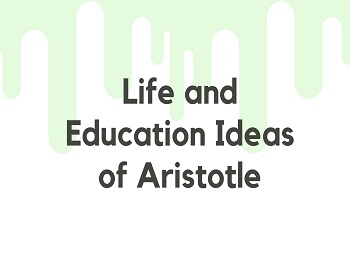
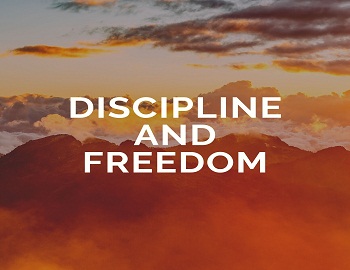
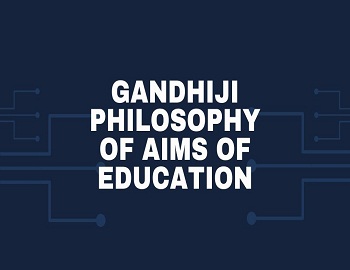
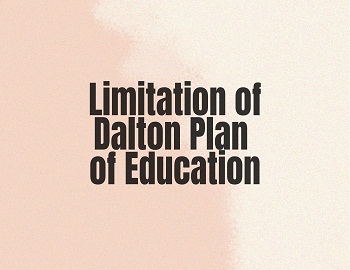
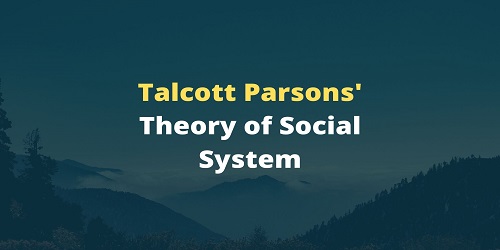

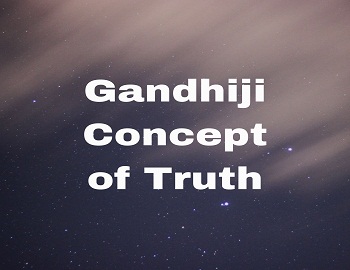
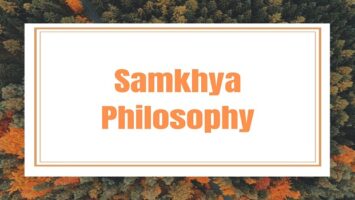
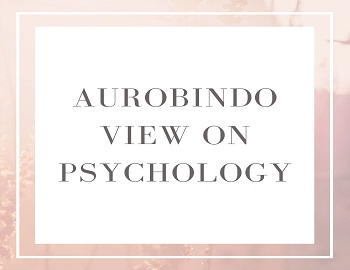
Comments (No)